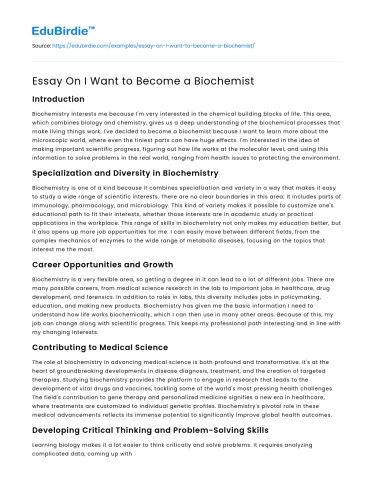Introduction
Biochemistry interests me because I'm very interested in the chemical building blocks of life. This area, which combines biology and chemistry, gives us a deep understanding of the biochemical processes that make living things work. I've decided to become a biochemist because I want to learn more about the microscopic world, where even the tiniest parts can have huge effects. I'm interested in the idea of making important scientific progress, figuring out how life works at the molecular level, and using this information to solve problems in the real world, ranging from health issues to protecting the environment.
Specialization and Diversity in Biochemistry
Biochemistry is one of a kind because it combines specialization and variety in a way that makes it easy to study a wide range of scientific interests. There are no clear boundaries in this area; it includes parts of immunology, pharmacology, and microbiology. This kind of variety makes it possible to customize one's educational path to fit their interests, whether those interests are in academic study or practical applications in the workplace. This range of skills in biochemistry not only makes my education better, but it also opens up more job opportunities for me. I can easily move between different fields, from the complex mechanics of enzymes to the wide range of metabolic diseases, focusing on the topics that interest me the most.
Career Opportunities and Growth
Biochemistry is a very flexible area, so getting a degree in it can lead to a lot of different jobs. There are many possible careers, from medical science research in the lab to important jobs in healthcare, drug development, and forensics. In addition to roles in labs, this diversity includes jobs in policymaking, education, and making new products. Biochemistry has given me the basic information I need to understand how life works biochemically, which I can then use in many other areas. Because of this, my job can change along with scientific progress. This keeps my professional path interesting and in line with my changing interests.
Contributing to Medical Science
The role of biochemistry in advancing medical science is both profound and transformative. It's at the heart of groundbreaking developments in disease diagnosis, treatment, and the creation of targeted therapies. Studying biochemistry provides the platform to engage in research that leads to the development of vital drugs and vaccines, tackling some of the world's most pressing health challenges. The field's contribution to gene therapy and personalized medicine signifies a new era in healthcare, where treatments are customized to individual genetic profiles. Biochemistry's pivotal role in these medical advancements reflects its immense potential to significantly improve global health outcomes.
Developing Critical Thinking and Problem-Solving Skills
Learning biology makes it a lot easier to think critically and solve problems. It requires analyzing complicated data, coming up with theories, and planning and carrying out very careful experiments. For these processes to work, you need to have a deep understanding of how chemicals and living things interact with each other and be able to use complex datasets to come to reasonable conclusions. This rigorous analytical method not only improves your scientific knowledge, but it also helps you develop skills that can be used in a wide range of careers.
There is a lot of value in being able to approach problems systematically and come up with new ways to solve them. Biochemists are good at this, and it shows in whatever field they choose.
Interdisciplinary Nature and Research Opportunities
Biochemistry stands at the crossroads of multiple scientific disciplines, offering a rich, interdisciplinary research landscape. It merges principles of biology, chemistry, and physics, paving the way for innovative research in areas as varied as agriculture, environmental science, and energy production. This interdisciplinary nature fosters a comprehensive understanding of life at a molecular level, leading to discoveries that can revolutionize various sectors.
Research opportunities in biochemistry are not confined to traditional laboratory settings; they extend to fields like bioinformatics and biotechnology, where biochemists can explore and address complex scientific questions with far-reaching implications.
Real-World Impact and Solving Complex Problems
Addressing and fixing problems in the real world depends on biochemistry. Biochemists significantly add to the creation of new medicines, vaccines, and agricultural innovations by using their biochemical knowledge. Their work is very important for solving problems like providing food security and protecting the environment. Researching biological cells and how they react helps people come up with new ways to solve some of society's biggest problems. Physiology has real-world effects, like making healthcare better and raising people's quality of life. These effects show how important physiology is for society's progress and betterment.
Conclusion
To sum up, I want to be a scientist because of how much this field affects science and society, how intellectually challenging it is, and how many chances it gives me for personal and professional growth. Critical thinking, problem-solving, and study from different fields come together in a way that is unique in biochemistry. The field is important in the real world because it helps advance medical science, protect the environment, and improve global health and food production. As a biochemist, you will be involved in some of the most exciting and important scientific projects of our time, and you could make a real change in the world.






 Stuck on your essay?
Stuck on your essay?

